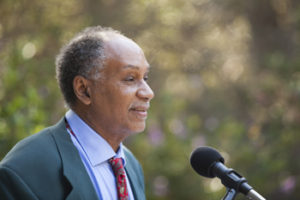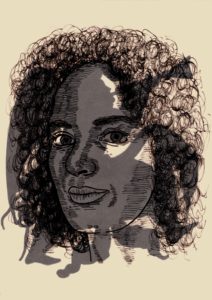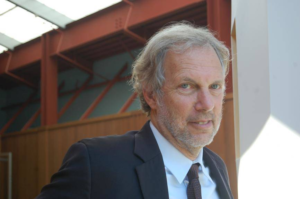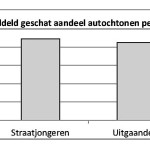Chomsky: Coup Attempt Hit Closer To Centers Of Power Than Hitler’s 1923 Putsch
Even as the Biden administration takes the reins of power, the fact remains that authoritarianism and a fascist strain of political thinking have taken firm root on U.S. soil among a large proportion of its citizens. This utterly disturbing development will, according to Noam Chomsky in this exclusive interview for Truthout, be hard to contain. A recent poll shows that the overwhelming majority of Republicans continues to give a thumbs up to Donald Trump, even after the storming of the Capitol. In the wake of the attempted coup, and on the cusp of a new administration, what do the current political currents mean for the future?
C.J. Polychroniou: Noam, you had been warning all along of a potential coup in the event that Trump would lose the 2020 election. In thiscontext, are you surprised at all by what took place on Capitol Hill on the Electoral College vote count?
Noam Chomsky: Surprised, yes. I’d expected a strong reaction from Trump’s voting base, raised to a fever pitch by his latest antics. But hadn’t expected the attempted coup to reach this level of violence, and I suspect most of the participants didn’t either. Many seemed to have been caught up in the excitement of the moment when the leaders of the crowd surged into the hated Capitol to drive out the demons who were not just “stealing the election” but “stealing” their country from them: their white Christian country.
That it was an attempted coup is not in question. It was openly and proudly proclaimed as just that. It was an attempt to overturn an elected government. That’s a coup. True, what was attempted was not the kind of coup regularly backed by Washington in its dependencies, a military takeover with ample bloodshed, torture, “disappearance.” But,nevertheless, it was an attempted coup. True, the perpetrators regarded themselves as defending the legitimate government, but that’s the norm, even for the most vicious and murderous coups, like the U.S.-backed coup in Chile on the first 9/11 – which was actually much worse in virtually every dimension than the second one, the one that we remember and commemorate. The first one is best forgotten on the principle of “wrong agents”: Us, not some radical Islamic fundamentalists.
The emotions of those attempting the [Capitol] coup were apparent.Belief that the election was stolen was plainly held with real fervor. And itis understandable among people who live in passionately pro-Trump areas where he is revered as their savior, and for some, even chosen by God, as he once declared. Many may scarcely have seen a Biden sign, or heard anything from Fox News or Rush Limbaugh to suggest some possible flaw in their beliefs.
In some respects, these beliefs are not as bizarre as they may look at first. A shift of tens of thousands of votes in a few counties might have swung the election the other way in a deeply undemocratic system such as ours,where 7 million votes can be swept aside along with an unknown number of others eliminated by purging, gerrymandering, and the many other devices that have been devised to steal the election from the “wrong people,” effectively authorized by the Supreme Court in its shameful 2013 decision nullifying the Voting Rights Act (Shelby County v Holder).
As we’ve discussed before, the malevolent figure in charge deserves credit for his talent in tapping the poisonous streams that run not far below the surface of American society, with sources that are deep in U.S.history and culture.
White Freedom: An Interview With Tyler Stovall
The idea of freedom has a contradictory legacy in the modern western world: it’s all about whiteness mixed with practices of racial inequality and discrimination, argues Tyler Stovall, Distinguished Professor of History, Emeritus, at the University of California at Santa Cruz, in his newly published work White Freedom: The Racial History of an Idea (Princeton University Press, 2021). In the interview that follows, Tyler Stovall discusses the main thesis of his book, highlights the difference in the way conservatives and progressives view freedom, and talks the return of white supremacy in American politics.
C. J. Polychroniou: You have just published a new book, titled White Freedom: The Racial History of an Idea, in which you argue that freedom has been defined in the western political tradition in racial terms. Can you elaborate a bit on this thesis?
Tyler Stovall: I argue that in America, France, and other Western societies in the modern era freedom is central to white racial identity and that whiteness is an essential component of freedom. To be free is to be white, and to be white is to be free. The book explores how societies based on liberty, like the French and American republics, could without contradiction also practice racism against peoples of color because those who were not white by definition could not be free.
It also shows how the clarion call of liberty in these societies derived its force in part from its appeal to race.
CJP: Didn’t gender and class also play key roles in the social construction of freedom?
TS: Since those are not the primary subjects of this book my answer to this question is necessarily limited, but class and gender certainly also played an important role. One need only consider the history of voting as a political right in the modern era. In many Western democracies the franchise was only gradually granted to people without property, and until the twentieth century it was almost universally reserved for men. The right to property, a key component of freedom in capitalist societies, was also highly gendered, and more generally if one did not have property (the case of most working people in the modern era) one could not truly be free.
CJP: Isn’t it also the case that freedom has always meant something different to conservatives and progressives?
TS: To a certain extent, yes: conservatives have traditionally focused on individual liberty and negative ideas of freedom, freedom from, whereas progressives have tended to emphasize the freedom of groups from oppression based on class, race, gender, and other identities. I would say, however, that in many ways the conservative, individualistic interpretation of freedom has been dominant during the modern era, and that conservatives are more likely than progressives to foreground ideas of freedom in their politics. Many progressives give greater importance to equality than freedom, for example. Also, if you consider the very idea of liberal democracy, which I consider a kind of compromise between these two approaches, conservatives stress liberalism and progressives stress democracy.
CJP: Racism not only remains a major problem in American society, but race relations seem to have gotten worse over the last few years. In fact, we have seen the return of white supremacy in U.S. politics during Donald Trump’s reign of rage and destruction. What’s your explanation for this unsettling socio-political development which threatens the very fabric of American democracy?
TS: I’m not sure I agree with the basic premise of this question, because I don’t think that white supremacy ever went anywhere, and I don’t think it’s necessarily worse now than in the past. For example, what strikes me most about the Black Lives Matter movement is how many whites support it, in a way that would have been hard to imagine ten years ago. That said, there certainly remains lots of racism in American society, and I think it is due to the combination of two factors.
First, American society and culture are growing more multicultural and diverse, and second the living standards of many Americans, including working class whites, have declined significantly since the 1970s. Traditionally in American society lower class whites who had very little property or social status could take comfort in their whiteness and white privilege, but now that seems to many to be increasingly jeopardized. Those whites who invaded the Capitol building on January 6, 2001 felt that their communities and their futures were threatened by the new contours of American life, and as we have seen in such situations people react violently.
CJP: Given the thesis of your book, namely, that racism and freedom are intertwined in the western political tradition, isn’t there a need therefore to redefine freedom?
TS: I would say rather that it is important to reinforce universal ideas of freedom that have also existed in the West, and bolster their rejection of white freedom. For example, in my book I discuss the ways in which the Statue of Liberty has been an icon of white freedom, symbolizing the ability of European immigrants to achieve white privilege in America. My preferred solution to that would not be to take down Lady Liberty, but rather to underscore other kinds of liberty. The Statue of Liberty and the myths around it tend to obscure the fact that New York was one of America’s great slave ports, so why not have another statue in New York harbor that commemorates slave rebellions in New York as symbols of liberty? Many people in America and throughout the world have rejected white freedom and fought for liberty for all, and it’s important to honor their struggles.
—
C.J. Polychroniou is a political economist/political scientist who has taught and worked in universities and research centers in Europe and the United States. His main research interests are in European economic integration, globalization, the political economy of the United States and the deconstruction of neoliberalism’s politico-economic project. He is a regular contributor to Truthout as well as a member of Truthout’s Public Intellectual Project. He has published several books and his articles have appeared in a variety of journals, magazines, newspapers and popular news websites. Many of his publications have been translated into several foreign languages, including Croatian, French, Greek, Italian, Portuguese, Spanish and Turkish. He is the author of Optimism Over Despair: Noam Chomsky On Capitalism, Empire, and Social Change, an anthology of interviews with Chomsky originally published at Truthout and collected by Haymarket Books.
Essay Essentials Forensic Expertise. About the Ideal of an NFI – Handbook on Forensic Expertise
Introduction
This essay [1] is an unorthodox attempt to write a handbook on forensic expertise [2]. My intention is to bring about a real improvement of understanding for all criminal justice professionals, the “users of forensic expertise” in criminal procedure; in my opinion a timeless and very useful ideal.
In the light of my recent attendance at trials of 24 Dutch criminal cases it has become clear to me that, in almost every criminal case, a greater understanding and clearer explanation is desirable of natural sciences as practiced in technical laboratory research and executed on traces within the Netherlands Forensic Institute (NFI) in the truth-finding process in criminal law. The name for this kind of research into traces as part of the criminal process is Criminalistics.
Criminalistics is the natural scientific aspect of the forensic sciences. It focuses on natural scientific research on evidence on behalf of truth-finding in criminal law. And It is directed towards the significance of the results of such research for that truth-finding. [3]
The explanation of an expert in court (art. 339, paragraph 1, sub 4), and the expert’s report, the written documents (art. 339, paragraph 1, sub 5 ) are the two different kinds of legal evidence, regarding the expert. Limited to these and combined with the judge’s own observations, the declarations of the suspect, and the declarations of a witness (art.339, paragraph 1, sub 1, 2, and 3), these five constitute the – limited – means of legal evidence as recognized in the Dutch Code of Criminal Procedure.
Even though forensic research is also carried out by other authorities, such as the Police, (semi) private institutes, – laboratories, – individuals and Universities, I have decided to take the NFI as my starting-point, for two reasons:
1. In 2020 the lion’s share of the forensic research concerning traces in connection with criminal offences in the Netherlands is still executed – on a high scientific level – by the NFI.
This research is commissioned by the Public Prosecution Office at the stage of investigation and prosecution, at the request of the examining magistrate / inquiry judge, the judge and, in some cases, also at the request of the defence.
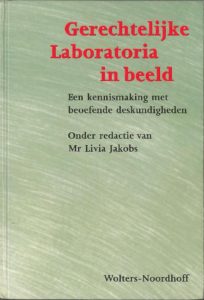
2. In 1995 I had the privilege of being allowed to initiate and draw up a book of reference [4] about forensic expertise as practiced then by the predecessors of the NFI, called ‘The Forensic Laboratories’. I distinguished at the time 31 areas of expertise, and in close cooperation with 31 experts a powerful source of knowledge was created at the service of the sitting and standing magistracy, and recommended as literature for the Police Academy.
After 25 years, in my view, it is now the right time to redefine the current conditions for a better understanding of the forensic kinds of expertise in the shape of:
A Blueprint, describing the essentials of background-knowledge, theory, practice and science, for each field of expertise.
In order to illustrate the importance of a systematic composition of a reference book and a textbook about forensic expertise, I have arranged the arguments into four groups.
A. Why? Finding reasons,
B. What? Table of contents, strengthening the beta-sciences and techniques,
C. How? Method, describing essentials in the connecting Blueprint,
D. What for? Improving the understanding of the target audiences and thus enlighten the criminal procedure.
A. Why? Finding reasons.
Signals from the Dutch criminal trials 2014-2019
From the end of 2014 to 2020 Ir. Huub Hardy [5] and myself were present at 24 heavy criminal cases in Dutch courts and tribunals [6] [Appendix 1 Dutch Criminal Cases]. We made an inventory, a close analysis and minutes of the cases. These criminal cases were selected on the basis of the role of the experts in the proceeding. In such trials, more often than not, the judicial experts were physically present and made declarations in court.
My focus in these cases was on the communication, i.e. the dialogues between experts and lawyers, as I heard them in court and saw them with my own eyes. I made notes from which lawyers’ needs in practice were found and from which lawyers’ wishes could be distilled.
In 9 of the 24 criminal trials (almost 38 %) judges, public prosecutors and barristers asked clearer literal explanations from the experts, specifically linguistic, such as: ‘no jargon please’, ‘clearer terminology’, ‘layman language please’, ‘what is the meaning of’, ‘report is hard to read’, ‘what precisely do you mean’, ‘closer explanation please’.
In 17 of the 24 criminal trials (almost 71 %) experts turned up in court. Judges, public prosecutors and barristers asked them intensively, not only about their use of language, but also, at length, about the significance of working methods and skills, and about the professional background and experience of the expert.
The lawyers, usually alpha-trained, put many probing questions to the forensic experts (who had usually been trained in beta science or in technique) such as:
* what is the background-science of this expertise?
* how do the various methods of expertise / research operate?
* how do the underlying instruments and apparatus function in this expertise?
* can you explain the difference in research on the source-level [7] and on the activity-level [8] ?
* what is the meaning of contamination [9] and secondary transfer [10] ?
* what is the background-science of this expertise ?
* explanation new – recently developed- forensic techniques?
* explanation of Bayes Theorem [11] with the use of hypotheses, formulated in the conclusions of the forensic reports,
* what is the training, the experience, the background and the CV of the expert?
Leïla Slimani – De duivel zit in de details
‘Literatuur is harder nodig dan ooit, omdat die een enorme ruimte aan vrijheid biedt waarin alles gezegd kan worden, waar je het kwaad kunt aanroeren, het gruwelijke kunt vertellen en kunt breken met de regels van moraal en fatsoen. Literatuur brengt complexiteit en ambivalentie terug in een wereld die dat verwerpt.’
In de recent verschenen, kleine essaybundel De duivel zit in de details spreekt de Marokkaans/Franse schrijver Leïla Slimani zich in zes verhalende essays uit tegen moslimterrorisme dat de wereld heeft veranderd.
In De Duivel zit in de details is de door iedereen gerespecteerde en geliefde hoogleraar Amine Moussa de hoofdpersoon. Hij is bang en somber geworden, en wordt getergd door angstaanvallen en slapeloosheid ten gevolge van de fundamentalistische islambeweging die steeds meer vat krijgt op de samenleving. Zo wordt er in de wijk een ‘brigade ter bevordering van deugd en voorkoming van ondeugd’ ingesteld en hebben moslimfundamentalisten een groep jongeren doodgeslagen omdat ze ’s avonds uitgingen en niet meededen aan het gebed, of omdat ze alcohol dronken. Tijdens de laatste dagen van de ramadan staat Moussa in de rij bij de bakkerij Nour om gevulde crêpes voor zijn vrouw te kopen. Een moslima beticht hem van roken tijdens de ramadan. Beledigingen volgen, er wordt geschermd met God. “Iemand trekt aan zijn jasje. Dan rent hij weg.”
In één van de essays, Een leger van pennen, beschrijft Leïla Slimani hoe zij, op verzoek, in het hoofd kroop van een van de jonge daders van de moordpartij bij Charlie Hebdo en een fictieve tekst probeert te schrijven. Het lukt haar niet iets op papier te krijgen, niet omdat ze te laf is, maar domweg dat ze zich niet kon overgeven aan zo’n exercitie een paar dagen na de aanslag op 7 januari 2015. Ook miste ze op dit moment, teveel aangeslagen, de onweerstaanbare, innerlijke drang het essay te schrijven.
Bijna een jaar later, op 14 november 2015, schrijft zij ‘Fundamentalisten, ik haat jullie’ en heeft ze genoeg afstand genomen om te kunnen reflecteren op het bloedbad in haar geboortestad Parijs, waarna ze eerst nauwelijks haar mening durfde te ventileren uit angst domme dingen te zeggen in ‘een wereld die al bezwijkt onder onwetendheid en haat.’ Maar wat Leïla Slimani wel weet is dat we moeten strijden voor onze vrijheid, strijden tegen de weerzinwekkende ideologie van deze moordenaars. ‘Tegen barbaren, terroristen en fundamentalisten uit welke hoek dan ook heb ik maar één ding te zeggen: Ik haat jullie.’ We moeten ons niet verschuilen achter een zogenaamd respect voor culturen, ze gaat over haar nek van hun sharia.
Leïla Slimani (1981) wordt door de fundamentalistische islam gezien als een ongelovige vrouw uit de Magreb die haar ziel heeft verkocht aan het Westen, en een misdaad heeft begaan door een roman te schrijven. Ondertussen is ze wel een van de meest spraakmakende auteurs van dit moment. Ze won de Prix Goncourt met Een zachte hand. Ze is geboren in Marokko en werd tweetalig opgevoed: Marokkaans en Frans. Ze studeerde in Frankrijk politicologie en handelswetenschappen.
Leïla Slimani – De duivel zit in de details. ISBN 9789046823231. Uitgeverij Nieuw Amsterdam, Amsterdam, 2021
Zie interview met Margot Dijkgraaf over haar boek haar boek ‘Mathilde’:
Crossing Border. On Tuesday the 16th of June, we welcomed bestselling author Leila Slimani (The Perfect Nanny, Adèle) for a free online BorderKitchen. She was interviewed by Margot Dijkgraaf about her new book, Mathilde. At the end of the interview, viewers had the opportunity to ask questions to the author and human rights activist.
About Mathilde: 1946. The young, French, Mathilde falls head over heels for Amine, a Moroccan officer of the French army. They get married and leave for a secluded family farm, hours from Rabat. How can their love, which is constantly being tested, stand the test of time? Mathilde is the first part of the ‘The Land of the Others’-trilogy. The story was based on her family history and entered the French bestseller charts at number one. Leila Slimani (Morocco, 1981) is the bestselling author of The Perfect Nanny, winner of the Prix Goncourt, and Adèle, for which she won the La Mamounia Prize. Thank you to Uitgeverij Nieuw Amsterdam.
Linda Bouws – St. Metropool Internationale Kunstprojecten
Chomsky And Pollin: A Global Green New Deal Is The Only Way To Avert Disaster
Global warming is the biggest challenge facing humanity today. Yet, climate change has yet to become our number one priority even though, as the World Meteorological Organization warned back in March 2020, “time is fast running out” on averting an acute environmental catastrophe.
In this context, a comprehensive Green New Deal is urgently needed to be put into action. A Global Green New Deal. And, hopefully, the incoming Biden administration will not squander the opportunity to have the U.S. take the lead on climate emergency now that the Senate is under Democratic control.
In the interview that follows, Noam Chomsky and Robert Pollin explain the urgency of undertaking ambitious efforts to respond globally to the existential crisis of climate change within the context of a just transition to a green economy. Chomsky and Pollin are joint recipients of the 2020 Climate Courage Award granted by the Climate Change Leadership Institute for their book Climate Crisis and the Global Green New Deal and its articulation of “a global solution that is not only bold and viable but also replete with the need for a just transition.”
C.J. Polychroniou: Noam, the outgoing Trump administration was the worst thing that could have happened for the environment. Trump rolled out dozens of deregulation policies. His administration reversed the Obama-rule on methane emissions, even though methane, the natural ingredient in natural gas, is 84 times more potent than carbon dioxide. Meanwhile he denied the science of climate change and withdrew the United States from the Paris climate agreement. What can we expect from the Biden administration on climate emergency, especially now that the Senate is under Democratic control, and why is it so important that the U.S. should rejoin the Paris Agreement?
Noam Chomsky: Rejoining the Paris Agreement is imperative, but only a bare beginning. The Agreement was an important step forward. It is, however, very weak, not even close to what has to be done. It also has no teeth: it is voluntary, no binding commitments. The primary reason for the weakness is the U.S. Republican Party, which would not permit anything that went much beyond symbolism. The Party is still there. In fact, it just achieved overwhelming success in the November 2020 elections, winning at every level except for the White House, where distaste for Trump’s antics prevailed. That victory is quite astonishing if only in light of the fact that the Party’s leaders were responsible for killing tens if not hundreds of thousands of Americans in the preceding months — not to speak of racing to the abyss of environmental catastrophe, a fact that scarcely registered.
The Party is still there, a dominating force, poised to ensure that the country is ungovernable, a specialty of Senate Republican leader Mitch McConnell as he proclaimed with pride during the Obama years and demonstrated with considerable success.
And Trump is not gone, far from it. A large majority of the Republican voting base regards him as their leader, if not savior. They can be whipped up to threaten any Republican office holder who dares to depart from Trump-McConnell malevolence, much as the Tea Party was organized and used for that purpose, with plenty of funding from powerful concentrations of capital. It may be recalled that as recently as 2008, during the McCain campaign, Republicans were willing to entertain the thought that there might be some problem about destroying the climate that sustains life. With virtual unanimity, they succumbed to a juggernaut launched by David Koch to extirpate that heresy, a victory that remains in place. With Trump setting himself up as the “true victor” in the elections, stirring up poisons in the ways he masters very well, there will be serious barriers to returning the country to a moderately civilized course.
How serious the barriers are we saw right before our eyes on January 6, a fateful day.
Ever since he gained office, Trump has been working hard to turn the country into a tin-pot dictatorship under his rule, a process we have been discussing regularly in this forum as it has unfolded.
To repeat briefly, there have been three prongs to the assault against the world by this miserable creature:
1. Destroying the environment that sustains life
2. Sharply increasing the threat of terminal nuclear war;
3. Dismantling formal democracy.
The first one alone suffices to establish him as arguably the most dangerous political figure in human history, a truism that has been hard for many to contemplate.
Right now we are witnessing the next step in his dedication to destroy American democracy. He has been bragging for years about the “Tough Guys for Trump” — his Black and Brown Shirts.
On January 6, he unleashed them, encouraging their violence and destruction as they broke into the Capitol Building to prevent formal ratification of his electoral defeat, which, it seems, he will never acknowledge no matter how much destruction is caused by his malevolence.
In his disgraceful performance calling on his tough guys to go home — for now — he could not refrain from stirring up more poisons with brazen lies about how his “landslide victory” was stolen by evil forces, doing what he can to ensure maximum damage to the country to which he intends to return triumphantly to complete the wreckage.
Would A Bobi Wine Presidential Victory Bring Freedom And Prosperity To Uganda?
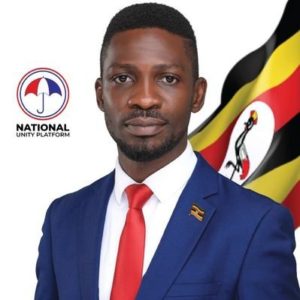 Robert Kyagulanyi Ssentamu—better known to the public as Bobi Wine—is a singer turned politician who is currently campaigning in the January 2021 general election to oust Uganda’s President Yoweri Museveni who has been in power for more than 30 years.
Robert Kyagulanyi Ssentamu—better known to the public as Bobi Wine—is a singer turned politician who is currently campaigning in the January 2021 general election to oust Uganda’s President Yoweri Museveni who has been in power for more than 30 years.
Bobi Wine, with a widespread following and popularity among a significant segment of the Ugandan population, has emerged as a strong challenger to Museveni. As a musician, many of Wine’s songs take a socially conscious tone by speaking out against poverty, and in favor of freedom and democracy for Ugandans. Wine grew up in one of the nation’s poorest neighborhoods in the capital city of Kampala and his rise from poverty to being a successful singer, and then an elected Member of Parliament, has been viewed as an inspiration to many of his followers who regard him as ‘the Ghetto President’.
Since Wine’s election as Member of Parliament in 2017, he strongly opposed authoritarian measures imposed by Museveni such as the President’s decision to remove age limits and Wine publicly rallied against the President’s decision to impose a social media tax to stifle opposition towards him on WhatsApp, Facebook, and Twitter.
During this time, Wine also created a national movement called “People Power”— a movement consisting of, as The Economist describes, “a messy coalition of established politicians, frustrated graduates, and the hustlers of his ghetto hinterland.”
The purpose of the movement is to bring awareness to Museveni’s improper governance and to challenge conventional politics. In response to Wine’s public demonstrations against Museveni, Wine has been subjected to state-sanctioned torture and repeated arrest. Most notably, in August 2018, allegedly on the orders of President Museveni, the Ugandan Security Forces fired live bullets into a crowd of Wine supporters, killed Wine’s personal driver, invaded the hotel that Wine was staying in and proceeded to arrest and subsequently torture him and his colleagues.
On July 24 th , 2019, Wine announced his bid to run for president in the 2021 general election. In July 2020, Wine announced himself as the leader of the rebranded and previously obscure political party, the National Unity Platform (NUP). The formation of such a party, with its conventional structure and authority over candidates, comes in contradiction with the spirit of Wine’s People Power movement aimed at challenging conventional politics. In addition, it has been reported that Wine’s new party has engaged in transactional politics. For instance, Derrick Ssonko, who is a mechanic, felt inspirited to run for local councilor, “but the party ticket went to a rival who paid a bribe. He worries that the NUP is ‘old wine in new bottles’ even though everyone he knows will vote for it.”
During his Presidential campaign, supporters of Wine have been met with police violence. In November, 54 people were killed as supporters called for the release of Wine from detention.
Wine had been arrested at a campaign rally. Uganda’s security forces have routinely prevented Wine from attending his campaign rallies and the President has prevented Wine from appearing on TV and radio stations. Most recently, the United States’ Secretary of State, Mike Pompeo, publicly condemned tactics within Uganda to suppress free and fair elections. In addition, Eliot Engel, the chairperson of the US House Committee on Foreign Affairs, has requested that the US impose sanctions on several Ugandan security officials in response to “a worsening of human rights in the country.” In order to prevent Museveni from rigging the election, Wine has said that he hopes for an overwhelming turnout at the ballot box to make it difficult for Museveni to do so.
Uganda consists of a nation where 80% of the population is under the age of 35, and for these individuals, Bobi Wine brings a great deal of hope for a better life. The disparity in the demographics has created a generational divide whereby Museveni is viewed as unpopular among the youth but is viewed as popular among older rural voters who view regime change as “a hauntingly perilous idea”—linking such change to the years of bloody horror that preceded Museveni.
However, it must be met with cautious optimism whether, as a politician, Wine would be able to deliver on his promises or whether Wine’s victory would mean a continuation of corrupt politics. In Wine’s campaign manifesto he states, “Our promise to the youth of Uganda, we shall ensure we find meaningful employment for you. We want to create at least 5 million jobs. We shall invest in technology and a massive scale of industrialization……A vote for NUP is an assurance that citizens will never be persecuted for disagreeing with the government. A vote for NUP is a vote for the protection of our natural resources as a country which Gen. Museveni now treats as his personal wealth. A vote for NUP is a vote for the closing of the income gap between the rich and the poor…. Our promise to all Ugandans is that we shall safeguard their land. We shall put an end to the enormous scale of land grabbing. If it is done, justice must prevail… The National Unity Platform is committed to working with all Ugandans to improve their lives. We believe that immediately after taking over government, every Ugandan from Kaabong to Kisoro, from Yumbe to Busia will experience meaningful change in their way of life……”
Despite such progressive electoral promises, it remains publicly unclear as to how Bobi Wine proposes to accomplish them. Wine’s political headquarters has images of pan-African heroes like socialist leader Thomas Sankara, but Wine has also been known to collaborate with free-market thinktanks. Wine said that his goal is to rebuild public institutions and end decades of personalized rule, but Wine himself has also said, “I don’t have a very radical programme.” In President Museveni’s first year in office, he published a book entitled, “What’s Africa’s Problem?”—in which he stated, “The problem of Africa, in general, and Uganda in particular, is not the people but leaders who want to overstay in power.” Bobi Wine’s call for freedom, democracy, and prosperity for Ugandans were the same political views that Museveni had once politically embraced long ago, but gradually, with time, Museveni became a corrupt authoritarian leader—if Bobi Wine won, would he be capable of ending the repetition of that authoritarian cycle?
—
Pitasanna Shanmugathas is a second year MGA student. During his undergraduate studies in political science and criminology at the University of Toronto, Pitasanna volunteered with the Canadian Centre for Victims of Torture, primarily providing support to refugees fleeing persecution in their native countries. Pitasanna is the director of a social media group, consisting of over 2,500 members, that speaks out against past and ongoing human rights abuses in Sri Lanka carried out by both state and non-state actors — as director Pitasanna has interviewed Sri Lankan politicians, journalists, and activists to bring greater awareness to the country’s ethnic tensions and human rights abuses. In 2017, Pitasanna launched a petition, which was later introduced in Parliament, calling on the Trudeau government to accept Rohingya refugees into Canada. His career goals include working with organizations to protect the rights of refugees and minority communities and advocating for constitutional reform in nations besieged by conflict.

